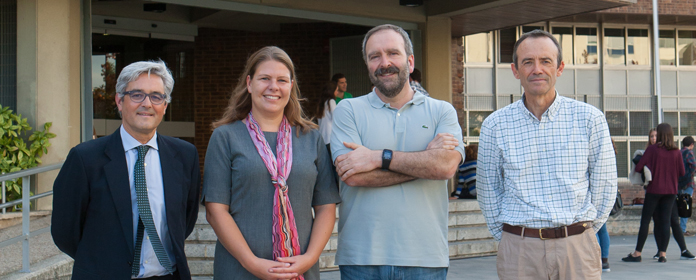Exercising intensely for 10 minutes a day financial aid to reduce the risk of developing cancer.
Dr. Pernille Hojman claims at the University that this internship "can increase white blood cells in the blood by 300%."

PHOTO: Manuel Castells
According to Dr. Pernille Hojman, researcher at the Centre of Inflammation and Metabolism of the Copenhagen University Hospital, practicing intense exercise for 10 minutes a day increases the presence of white blood cells in the blood by up to 300%, "which financial aid reduces the risk of developing cancer, as has already been demonstrated by several programs of study". This was stated by the expert during a lecture organized by the School of Pharmacy and Nutrition of the University of Navarra.
As the expert explained, the work of her group of research consists precisely in understanding how the internship of sport can influence the prevention or control of the size of a tumor: "The programs of study that we have carried out on mice reveal that while they exercise, the cells of the immune system are mobilized towards the circulatory system, so that they can locate the cancerous cells and attack them, thus fighting and reducing the size of the tumor".
In fact, Dr. Hojman explains that there are programs of study confirming the role of sport in reducing the risk of up to 13 types of cancer: "Although we do not yet have enough data on the subject of sport and the most recommended frequencies, our models show the positive role of the daily exercise internship of short duration (10 minutes) but high intensity, with a significant increase in heart rate".
Sport also for cancer patientsIn the case of the murine models (mice) on which his team has worked, the results obtained revealed that there were two substances, epinephrine and interluquine 6, which, when administered as drugs, produced the same effect of increasing the levels of white blood cells in the blood. "However, what we have seen so far in humans makes us think that to achieve the same result is more effective the direct internship of sport, since the activation of the muscles triggers the stimulation and maturation of the cells of the immune system," stresses the Norwegian researcher.
In this sense, the expert invited by the School of Pharmacy and Nutrition of the University of Navarra and by the Center of programs of study, research and Sports Medicine of Pamplona, insisted that the positive effects of the internship of sport should also be extended to cancer patients: "We are currently developing programs of study intervention with more than 100 patients and in no case has sport caused negative effects, so we propose that patients perform brief but intense daily exercises with a significant increase in heart rate, which is at the same time healthy for them and improves the functioning of their immune system."




